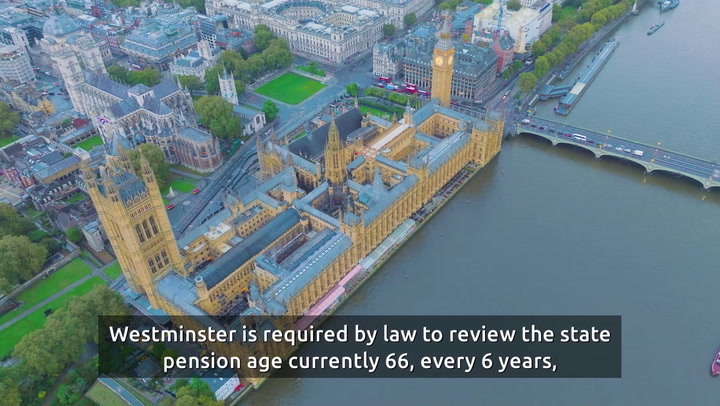The New State Pension age is set to start rising to 67 from next year. State pension age to be reviewed by UK Government amid fears that 45% of workers are not saving
State pension age to be reviewed by UK Government amid fears that 45% of workers are not saving
The State Pension age is set to start rising from 66 to 67 next year, with the increase due to be completed for all men and women across the UK by 2028. The planned change to the official age of retirement has been in legislation since 2014 with a further rise from 67 to 68 set to be implemented between 2044 and 2046.
However, a new online petition is calling for the State Pension age to remain at 67. Campaigner Steven Hillyer proposes keeping the age of retirement at 67 for people born before 1977, who have “planned their retirement accordingly”.
He added: “We think it is already far enough off and many people simply cannot work longer. We think they have paid in their dues and it is totally unfair to move their entitlement further away at a late stage in their lives.”
READ MORE: New calls to increase weekly State Pension payments to £586 for every person aged over 60READ MORE: New State Pension age set to change next year for people with these birthdays
At 10,000 signatures of support the petition would be entitled to a written response from the UK Government. At 100,000, the Petitions Committee would consider it for debate in Parliament – view it in full online here.
Workers aged 51- 53 could be the first affected if the State Pension age rise to 68 is brought forward by a year, potentially reducing their pension payments by up to £17,774, according to new calculations by Rathbones, one of the UK’s leading wealth managers.
Under current law, the State Pension age will rise from 66 to 67 by April 2028, and then to 68 between 2044 and 2046. However, the UK Government could bring this change forward as part of a newly announced review into the State Pension age, which will assess whether the current age threshold remains appropriate in light of increasing life expectancy, rising public spending and a growing population.
Independent State Pension age reviews are legislated to take place every six years. The last independent state pension review, conducted by Baroness Neville-Rolfe and published in 2023, reaffirmed a commitment to a principle that at least ten years’ notice should be given of any increase in the State Pension age.
If the State Pension age rise to 68 is accelerated to 2039 – 41 instead of 2044 – 2046 following the review – due to conclude in 2029 – it could mean a loss of one year’s full State Pension payments, totalling £16,436 for workers aged 51, £16,114 for those aged 52 and £15,798 for those aged 53.
Rathbones’ calculations are based on the new full State Pension of £230.25 per week (£11,973 annually) and assume 2 per cent inflation per year thereafter – the Bank of England’s target inflation rate.
Under the State Pension Triple Lock guarantee (which guarantees at least a 2.5 % annual increase), those figures would rise to approximately £17,774 for workers aged 51, £17,340 for those aged 52 and £16,918 for those aged 53.
However, questions have been raised over the long-term affordability of the Triple Lock – which guarantees that the State Pension rises each year in line with either inflation, wage increases or 2.5 per cent – with the Institute for Fiscal Studies (IFS) recently warning it could cost up to £40 billion a year by 2050.
Rebecca Williams, Divisional Lead of Financial Planning at Rathbones, said: “With longevity increasing and population pressures mounting, future generations appear set to face a less generous State Pension regime than that enjoyed by many of today’s retirees. The situation appears particularly precarious for those in their early 50s who face the real prospect of missing out.
“We’ve seen a number of people in their late 40s and early 50s come to us seeking greater clarity on their retirement prospects. With shifting goalposts in the pension landscape, many are understandably keen to ensure they’re on track to retire comfortably and on their own terms.
“The State Pension alone is not enough for a comfortable retirement. Individuals need a broad foundation built on workplace pensions, private savings, and the ongoing support of pension tax relief.
“Cracks are beginning to show in the system, and they must be addressed urgently if we are to maintain faith in the UK’s pension framework and ensure people are equipped not just to survive, but to thrive in later life.”
 Get the latest Record Money news
Get the latest Record Money news
Join the conversation on our Money Saving Scotland Facebook group for money-saving tips, the latest State Pension and benefits news, energy bill advice and cost of living updates.
Sign up to our Record Money newsletter and get the top stories sent to your inbox daily from Monday to Friday with a special cost of living edition every Thursday – sign up here.
You can also follow us on X (formerly Twitter) @Recordmoney_ for regular updates throughout the day or get money news alerts on your phone by joining our Daily Record Money WhatsApp community.

